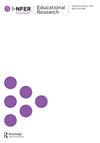Analyse, evaluate, review, synthesise, and argue: why teacher-assessors’ interpretations of command words matter
IF 2.6
3区 教育学
Q1 EDUCATION & EDUCATIONAL RESEARCH
引用次数: 1
Abstract
ABSTRACT Background Secondary school teachers sometimes teach and assess material outside their specialisms for reasons including staff shortages or the growing popularity of the interdisciplinary courses. We hypothesised that teacher-assessors with different subject specialisms may differ in their interpretations of frequently used words in teaching and assessment, such as ‘analyse’ and ‘evaluate’. Differing interpretations of these seemingly generic command words are worthy of investigation because they may have implications for the clarity and success of teaching and assessment. Purpose The aim of this small-scale study was to identify and analyse teacher-assessors’ interpretative differences of command words commonly used in teaching and assessment in order to draw out implications for students’ learning and assessment outcomes. Method Written definitions for five common command words (analyse, evaluate, review, synthesise and argue) were obtained from six published sources and also from nine experienced teacher-assessors in England covering seven subjects. A directed qualitative content analysis was conducted, entailing comparisons across individual definitions and across the humanities and sciences. Findings For all five command words, definitions were found to vary in both conceptual complexity and subject specificity, sometimes within the same subject. Fundamentally different concepts were identified for ‘review’ (which may or may not entail making a judgement about material) and ‘argue’ (which may or may not focus on reasoning). This could be an important cause of confusion for some students and may limit the depth of teaching and understanding for others. Furthermore, such differences could reduce agreement among assessors and undermine the appropriateness of the inferences drawn from the outcomes of assessments. Conclusion This small-scale investigation highlights the importance of building shared understandings of assessment criteria. Although assessor standardisation is the norm and occurs via formal procedures within large examination boards, the emphasis on it may be considerably weaker in less regulated teacher-assessor contexts. Further research could usefully focus on training and support the needs of non-specialist teachers and interdisciplinary course developers, strengthening communities of practice.分析、评估、回顾、综合和争论:为什么教师评估者对命令词的解释很重要
摘要背景中学教师有时会出于人员短缺或跨学科课程日益普及等原因,在专业之外教授和评估材料。我们假设,不同学科专业的教师评估员对教学和评估中常用词的解释可能不同,如“分析”和“评估”。对这些看似通用的命令词的不同解释值得研究,因为它们可能对教学和评估的清晰度和成功性有影响。目的本小规模研究的目的是识别和分析教师评估员对教学和评估中常用命令词的解释差异,以得出对学生学习和评估结果的影响。方法从六个已发表的来源以及九名经验丰富的英国教师评估员那里获得五个常用命令词(分析、评估、复习、合成和争论)的书面定义,涵盖七个科目。进行了有针对性的定性内容分析,需要对个人定义以及人文科学进行比较。研究结果对于所有五个命令词,定义在概念复杂性和主题特异性方面都有所不同,有时在同一主题内。“审查”(可能需要也可能不需要对材料做出判断)和“争论”(可能侧重于推理,也可能不侧重于推理)确定了根本不同的概念。这可能是一些学生感到困惑的重要原因,也可能限制其他学生的教学和理解深度。此外,这种差异可能会降低评估人员之间的一致性,并破坏从评估结果中得出的推论的适当性。结论这项小规模调查强调了建立对评估标准的共同理解的重要性。尽管评估员标准化是常态,并通过大型考试委员会的正式程序进行,但在监管较少的教师评估员环境中,对标准化的重视可能会大大减弱。进一步的研究可以有效地侧重于培训和支持非专业教师和跨学科课程开发人员的需求,加强实践社区。
本文章由计算机程序翻译,如有差异,请以英文原文为准。
求助全文
约1分钟内获得全文
求助全文
来源期刊

Educational Research
EDUCATION & EDUCATIONAL RESEARCH-
CiteScore
4.00
自引率
2.90%
发文量
0
期刊介绍:
Educational Research, the journal of the National Foundation for Educational Research (NFER), was established in 1958. Drawing upon research projects in universities and research centres worldwide, it is the leading international forum for informed thinking on issues of contemporary concern in education. The journal is of interest to academics, researchers and those people concerned with mediating research findings to policy makers and practitioners. Educational Research has a broad scope and contains research studies, reviews of research, discussion pieces, short reports and book reviews in all areas of the education field.
 求助内容:
求助内容: 应助结果提醒方式:
应助结果提醒方式:


